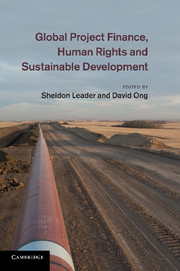Book contents
- Frontmatter
- Contents
- contributors
- Abbreviations
- Part I The framework
- Part II Special topics
- Part III Case studies
- 11 The implications of the Chad???Cameroon and Sakhalin transnational investment agreements for the application of international environmental principles
- 12 Project finance arrangements for the Baku???Tbilisi???Ceyhan project
- 13 The Orion and CMB pulp plants in Uruguay
- 14 The Newmont and AngloGold mining projects
- 15 Overview and recommendations
- Index
- References
11 - The implications of the Chad???Cameroon and Sakhalin transnational investment agreements for the application of international environmental principles
Published online by Cambridge University Press: 07 September 2011
- Frontmatter
- Contents
- contributors
- Abbreviations
- Part I The framework
- Part II Special topics
- Part III Case studies
- 11 The implications of the Chad???Cameroon and Sakhalin transnational investment agreements for the application of international environmental principles
- 12 Project finance arrangements for the Baku???Tbilisi???Ceyhan project
- 13 The Orion and CMB pulp plants in Uruguay
- 14 The Newmont and AngloGold mining projects
- 15 Overview and recommendations
- Index
- References
Summary
Introduction
This chapter will assess the implications of two ‘transnational’ investment agreements (TIAs) involving both international and ‘transnational’ actors within two different geographical situations in terms of their application (or otherwise) of accepted international environmental principles. The first TIA involves two, sub-Saharan, west African developing countries (Chad and Cameroon), and the second TIA applies within a Eurasian transitional economy (Russian Federation). The term ‘transnational’ is used here to denote those agreements, organizations or institutions that are undoubtedly international in their scope but involve non-state actors, such as multinational/transnational corporations (MN/TNCs), acting in concert with states. The type of transnational agreements discussed here are TIAs involving MNCs/TNCs and their host states regarding the terms of their investments within the host state concerned. Within this context, two specific examples will be examined. These are first, the Chad–Cameroon Oil Development and Pipeline Project; and second, the Sakhalin II Petroleum Development and Pipeline Project, located on the island of Sakhalin in the far-eastern corner of the Russian Federation. These TIAs providing the regulatory and contractual framework governing the petroleum development and transportation activity in each of the two case studies examined here will be the focus of this contribution, in terms of the different legal relationships they have engendered between states, transnational corporations, civil society groups and other international and transnational actors.
- Type
- Chapter
- Information
- Global Project Finance, Human Rights and Sustainable Development , pp. 319 - 363Publisher: Cambridge University PressPrint publication year: 2011
References
- 1
- Cited by



